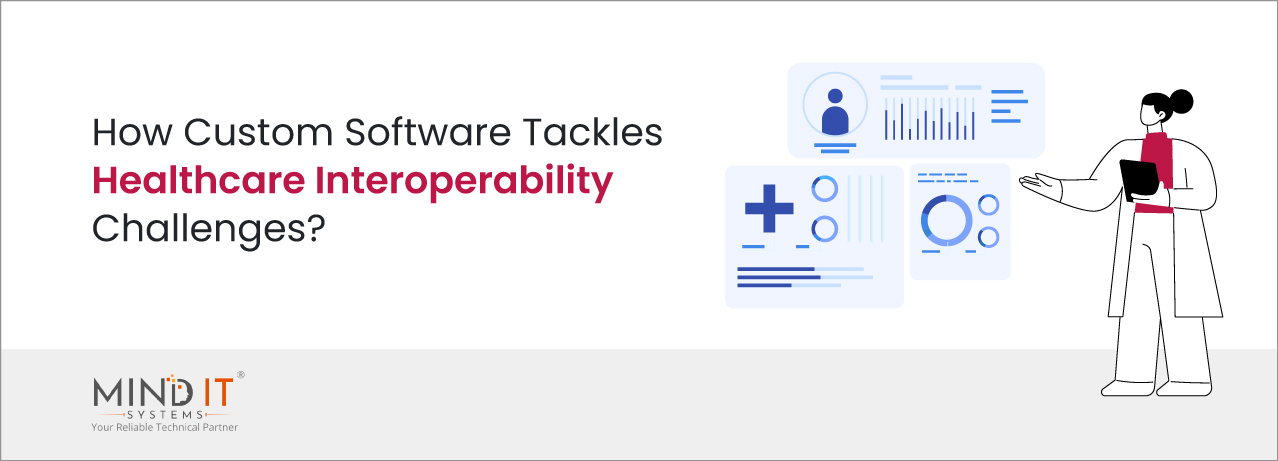
How Custom Software Tackles Healthcare Interoperability Challenges?
Introduction
Every year, fragmented data systems cost healthcare organizations over $750 billion and put lives at risk. Yet, many providers still rely on outdated platforms that block data exchange, delay treatment, and increase compliance risks.
Interoperability is no longer optional—it’s a foundational pillar for care innovation, digital transformation, and operational resilience.
This blog breaks down how custom healthcare software can bridge the gaps where off-the-shelf systems fail, helping you reduce overhead, stay compliant, and build a connected care ecosystem that scales with your needs.
Dive in.
What is Healthcare Interoperability and Its Roadblocks?
Healthcare interoperability refers to the ability of different IT systems and software applications to access, exchange, and cooperatively use data in a coordinated manner, across organizational boundaries.
There are three main layers of interoperability:
- Technical interoperability: Basic exchange of data between systems.
- Syntactic/data interoperability: Ensures the format and structure of the data are understood.
- Semantic interoperability: Certifies that the meaning of the data is preserved and used accurately.
Without all three levels in place, health systems struggle with fragmented workflows and communication gaps, directly impacting patient outcomes.
The Cost of Poor Interoperability: Quick Stats
- According to the Institute of Medicine, poor interoperability wastes about $750 billion annually in the U.S. healthcare system.
- Disconnected health systems cause $265 billion in yearly administrative overhead, per the Centers for Medicare & Medicaid Services (CMS).
- More than 60% of clinicians experience burnout related to managing fragmented Electronic Health Records (EHRs), reports the American Medical Association (AMA).
Ready to Eliminate Data Silos in Your Organization?
Discover how custom healthcare solutions can break down interoperability barriers.
The Real-World Impact of Interoperability Barriers
Here are the common hurdles that obstruct data sharing in healthcare:
- Outdated legacy systems incompatible with modern platforms.
- Non-standard data formats and varied protocols.
- Proprietary software blocking open integration.
- Regulatory pressure from HIPAA, GDPR, and other compliance frameworks.
Consequences Include:
- Increased administrative workload.
- Delays in diagnosis and treatment.
- Higher chances of medical errors due to incomplete data.
- Patient dissatisfaction and system inefficiencies.
Why Do Off-the-Shelf Solutions Fail?
Generic EHR or healthcare management systems are typical examples of various, healthcare software types, but their wide usability often means they lack the deep integration needed for complex care settings.
Common shortcomings:
- Can’t connect with legacy systems or specialized medical devices.
- Lack flexibility to adapt to unique hospital workflows.
- Struggle to stay compliant with evolving healthcare regulations.
For example, several hospitals reported delays in lab test results because their standard software couldn’t communicate with older imaging systems. These inefficiencies are more than operational—they compromise patient care.
How Custom Software Enables Healthcare Interoperability Solutions?
Custom healthcare software is particularly effective in specialized areas like managing chronic conditions and remote patient care, where continuous data flow and real-time communication between patients and providers are essential for effective treatment and monitoring.
Here’s how it directly tackles Health IT fragmentation and enables effective healthcare interoperability solutions:
- Tailored Integration for Diverse Systems
Custom software bridges the gap between legacy systems and modern tools using robust APIs and connectors, allowing smooth data exchange across departments, providers, and devices.
- Built on Interoperability Standards
Leveraging standards like HL7, FHIR, and DICOM (Digital Imaging and Communications in Medicine), custom solutions ensure that shared data retains accuracy and meaning—reducing miscommunication and improving clinical decisions.
- Advanced Security and Compliance
With built-in encryption, access controls, and detailed audit logs, these platforms keep patient data safe and aligned with HIPAA, GDPR, and other regulatory frameworks.
- Scalable and Future-Ready Architecture: Whether it’s integrating AI diagnostics or IoT-enabled health devices, custom-built solutions grow with you—eliminating the need for expensive overhauls later on.
Real-World Examples of Interoperability Success with Custom Tools
1. Cleveland Clinic’s Unified Data Platform
Cleveland Clinic implemented a custom-built data management system that unified patient records across departments. This eliminated delays in accessing critical information, significantly improving diagnosis turnaround time and clinician satisfaction.
2. Redox: API-Based Integration for Startups and Providers
Redox developed a flexible, API-first platform enabling seamless integration between EHR systems and digital health apps. It helped dozens of startups plug into hospital systems without custom builds, accelerating innovation and compliance.
3. Apple Health Records Integration with Major Hospitals
Apple partnered with multiple U.S. hospitals to create a secure, patient-facing interoperability tool. Their custom framework enabled patients to view records from different providers in one place, reducing dependency on fragmented portals.
Actionable Steps for Healthcare Providers Considering Custom Software
Creating seamless healthcare interoperability starts with clear, deliberate actions that address your organization’s unique challenges.
- Map out where data silos and delays occur to target the most pressing interoperability issues.
- Ensure compliance and robust security measures are embedded in your custom software from the start.
- Work with specialized healthcare software development partners who bring deep domain knowledge and technical expertise.
- Adopt a flexible approach with ongoing updates to adapt to new standards, devices, and evolving healthcare needs.
The Future of Interoperability Is Custom
Interoperability is no longer an ideal—it’s a foundational requirement for quality care, patient safety, and operational efficiency. While off-the-shelf platforms offer standardization, they often fail to enable the deep, seamless integrations healthcare environments demand.
Custom healthcare software bridges current gaps and prepares systems for tomorrow’s connected data-driven care models. Healthcare organizations can build intelligent, secure, and interoperable ecosystems supporting better outcomes with the right development partner.
This is where technology providers like Mind IT Systems bring tremendous value, offering deep expertise in crafting tailored healthcare software solutions that are compliant, future-ready, and built to deliver lasting impact.
Looking to upgrade your tech infrastructure?
Let’s help you build custom healthcare software that delivers secure and scalable interoperability.
FAQs on Healthcare Interoperability
1. What is healthcare interoperability?
Ans: Healthcare interoperability is the ability of different healthcare systems, applications, and devices to exchange, interpret, and use patient data across organizational boundaries.
I am text block. Click edit button to change this text. Lorem ipsum dolor sit amet, consectetur adipiscing elit. Ut elit tellus, luctus nec ullamcorper mattis, pulvinar dapibus leo.
2. Why is interoperability important in healthcare?
Ans: It ensures timely, accurate, and accessible patient information, improving care coordination, reducing errors, and enhancing overall healthcare delivery.
3. What are the biggest barriers to healthcare interoperability?
Ans: Common barriers include legacy systems, non-standard data formats, vendor lock-in, and strict compliance regulations.
4. What makes custom healthcare software better for interoperability?
Ans: Custom solutions are tailored to existing systems, use standards like HL7/FHIR, and are built with compliance and scalability in mind.
5. How does custom software support data security in healthcare?
Ans: It includes features like encryption, access controls, and audit trails to meet HIPAA, GDPR, and other security standards.
Share this post
About the Author

Sujoy Roy
(Head – Digital Marketing)
From my teenage time, I had a quench to solve problems and loved leadership. Starting my career in relation management, ignited my passion for managing people. While managing I realized technology needs to be incorporated to keep pace with the changing world & do my work efficiently.

